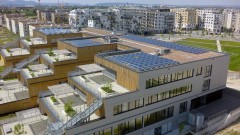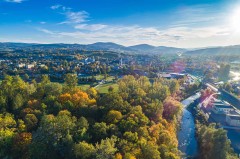Increasing urbanisation is one of the great global challenges. Over half the population of the world today lives in cities or conurbations; in Europe this level is expected to reach 80% by 2050.1 Cities consume large amounts of energy and resources, and cause over 70% of global greenhouse gas emissions.
Strategies for decarbonising urban energy and mobility systems, buildings and industry play a central role in the transition to a climate-neutral economy and way of life. Cities are centres of commerce, research, innovation and new technologies. They can become pioneers of sustainable economic, ecological and social change. Extremely dense usage and infrastructure means they offer great potential for testing innovative solutions such as cross-sector smart systems in practical conditions, providing the basis for wider rollout.
100 climate-neutral cities in Europe by 2030
In preparation for the new European research programme “Horizon Europe”, experts from all over Europe have defined five major missions, under the heading “Delivering solutions to some of our greatest global challenges”, which will shape European research for the period 2021-2027.2 These missions are intended to stimulate interdisciplinary research and innovations which will deliver solutions to society’s most important challenges. With the urban mission of “100 climate-neutral cities by 2030 – by and for the citizens” the European Commission aims to support 100 European cities in their transformation towards climate-neutrality by 2030. The Commission has presented initial strategic objectives, approaches, time frames and budgets to help achieve this. The “Mission Board for Climate-neutral and Smart Cities” has just published an interim report on this process.3
100 cities and towns will offer locations for experiments and demonstrate how decarbonisation can work in practice. A multi-step and co-creative process is formulated in a “Climate City Contract”, each one adapted to the realities of the city concerned. The aim is to create models for other European cities and in this way to contribute to implementation of the European Green Deal.4 Central to its success are the commitment and active engagement of the city’s residents as stakeholders in the planning, and as users, producers, consumers and investors.
Another key contributor is the “PED Programme”, a transnational RTI programme on the theme of “Positive Energy Districts”. Under Austria’s leadership this is being implemented by the Joint Programming Initiative Urban Europe, in cooperation with the European Strategic Energy Technology Plan (SET Plan). The objective of the programme is to set up 100 positive energy districts in Europe by 2025. In consultation with the cities, a shared definition is agreed and a certification model for positive energy districts is in development. Austria participates in the annual calls for proposals through the national RTI programme “City of Tomorrow”, and is actively pursuing the development of positive energy districts in Austrian cities.
National activities for sustainable development of cities and municipalities
Austria is a key player in the implementation of this European mission, through the national technology programme “City of Tomorrow”, run by the Federal Ministry for Climate Action, Environment, Energy, Mobility, Innovation and Technology (BMK), and the “Smart Cities Initiative” with its support programme “Smart Cities Demo”, led by the Climate and Energy Fund.
With its “City of Tomorrow” programme, the BMK aims to help set up positive energy districts, through research and development of urban technologies, technological systems and services, assisted further by digitalisation. This includes innovative technologies and concepts for the production, distribution, conversion and storage of energy, but also for optimising usage in buildings or groups of buildings, as well as technologies and efficiency measures in new construction and renovation.
https://nachhaltigwirtschaften.at/en/sdz/
The Climate and Energy Fund’s “Smart Cities Initiative” aims to accelerate the sustainable transformation of Austria’s cities and municipalities. In 2020 a new multi-step development process was launched to test innovative, future-oriented urban solutions (= “Urban Innovation Frontrunners”) – especially products, processes and services –, then to implement them more widely (= “Urban Innovation Followers”) and to scale them up (= “Urban Innovation Rollout”).
https://smartcities.at/home-en-us/
In this issue we present some projects in this topic area which are currently under way in Austria with support from the BMK and the Climate and Energy Fund. The focus is on the implementation of “positive energy districts”.
> aim for a positive annual energy balance
> use renewable energy, sector coupling, and energy flexibility
> are network compatible, improve grid operation and make an essential contribution to the renewable energy system
> include several buildings and take advantage of synergies in mixed usage
> strive for the highest possible building quality for new construction and renovation
> achieve a high level of energy direct-use or power grid injection
> use sustainable business models for buildings, energy efficiency and and renewable energy production and usage
nachhaltigwirtschaften.at/resources/sdz_pdf/plus-energie-quartier-folder-2019-en.pdf
2 “Horizon Europe Missions”: Conquering Cancer: Mission Possible, Accelerating the Transition to a Climate-prepared and Resilient Europe, Regenerating our Ocean and Waters, 100 Climate-Neutral Cities by 2030 – by and for the citizens, Caring for Soil is Caring for Life
3 nachhaltigwirtschaften.at/de/sdz/news/2020/20200710-100-klimaneutrale-staedte.php
op.europa.eu/en/web/eu-law-and-publications/publication-detail/-/publication/82f1df57-b68b-11ea-bb7a-01aa75ed71a1
4 The “European Green Deal” is the roadmap for a sustainable, competitive EU economy and aims to make Europe the first climate-neutral continent by 2050. The package of measures ranges from significantly reducing greenhouse gas emissions and investing in cutting-edge research and innovation, through to preserving the natural environment.
ec.europa.eu/info/strategy/priorities-2019-2024/european-green-deal_en


